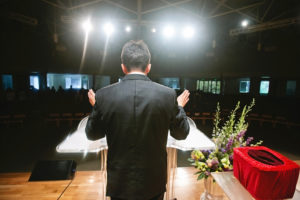How’s the Boss? Studies Show Power Increases Moral Hypocrisy

Over the past two years, Baptist Pastor Riley Brown has stolen an estimated $332,000 from the coffers of Broadmoor Baptist Church in Jackson, Mississippi. For three years, Pastor Robbie Wilkerson of the West Side Church in Chicago has embezzled more than $500,000 from their food program. Bob Silverman, a pastor at Empowering Life Church in Texas, stole upwards of $770,000 from his disabled sister after agreeing to move in and take care of her. No charges were brought against Brown, but he did lose his position with the church. Wilkerson lost his job, has been sentenced to five months in jail with an additional five months of house arrest, and over $400,000 in restitution.
While occurrences like these are awful, they aren’t exactly shocking. Anyone paying attention to the religious world, social justice issues, or even the nightly news can tell you that powerful people abuse their positions regularly.
There is a general assumption that those filling the roles of society’s “protectors,” be they police officers, teachers, or the clergy, are more moral and responsible than those they’re employed to protect. After all, they were given their powerful positions for those very reasons, and to us, the “normal folk,” it is assumed they deserve it. But, this is not often the case, giving the less morally responsible leaders the ability to abuse those under them with little recourse.
A Columbia University experiment studied how power corrupts the minds of those who possess it, more specifically noting how power changes the way people visually perceive others. According to the study, the most powerful people tend to perceive those who are less powerful as smaller in stature. In another series of studies, researchers observed how power increased moral hypocrisy. They found that powerful individuals tend to judge the powerless more harshly when caught in the act of cheating than when more powerful people are caught cheating. They also found that people in positions of power hold the less powerful to a stricter moral code than the one they held themselves to. The study goes on to suggest that the level of power and the legitimacy of the power do determine the extremity of the hypocrisy. Study authors Joris Lammers, Diederik A. Stapel, and Adam D. Galinsky said of their participants:
People with power not only take what they want because they can do so unpunished, but also because they intuitively feel they are entitled to do so. Conversely, people who lack power not only fail to get what they need because they are disallowed to take it, but also because they intuitively feel they are not entitled to it.
So why do we expect people in positions of power to be morally superior to the rest of us, especially when we witness their infractions all of the time? Doctors, teachers, police officers, priests, popes; many of them have abused, used excessive force, and cheated the system. A Stanford study shows that people with less power are far more trusting of those with more power. Karen Cook, Oliver Schilke, and Martin Reimann predicted their low-power subjects would be less trusting of powerful individuals who would place little value on them. Instead, they found that their low-power subjects possessed more hope and anticipated the interaction to be positive, which led to a higher level of trust than the researchers expected.
It seems that when we, regular folks, are in the presence of the more powerful and/or authoritative, the majority of us (low-powered individuals) would rather remain positive and hopeful about the interaction and trust that the high-powered people will make the right or moral decision, even if they have given us no reason to believe that. Even as the public trust in politicians and police officers is declining, the hope for trust remains.
The solution to this problem is unclear. Though a power hierarchy will always exist within societies, perhaps a more consistent distribution of power would be a good start. Until then, the less powerful need to learn to trust the “heroes” and moral “leaders” of society a little less blindly. In cases involving clergy like those I mentioned at the opening of the article, it’s important to remember that the people who look up to them also look beyond to an even more powerful but unseen creator who they likely believe chose the minister as an earthly agent to work through. Humanists must be willing to point out that these individuals weren’t hired by “God,” but rather chose a career path, just like everyone else.
